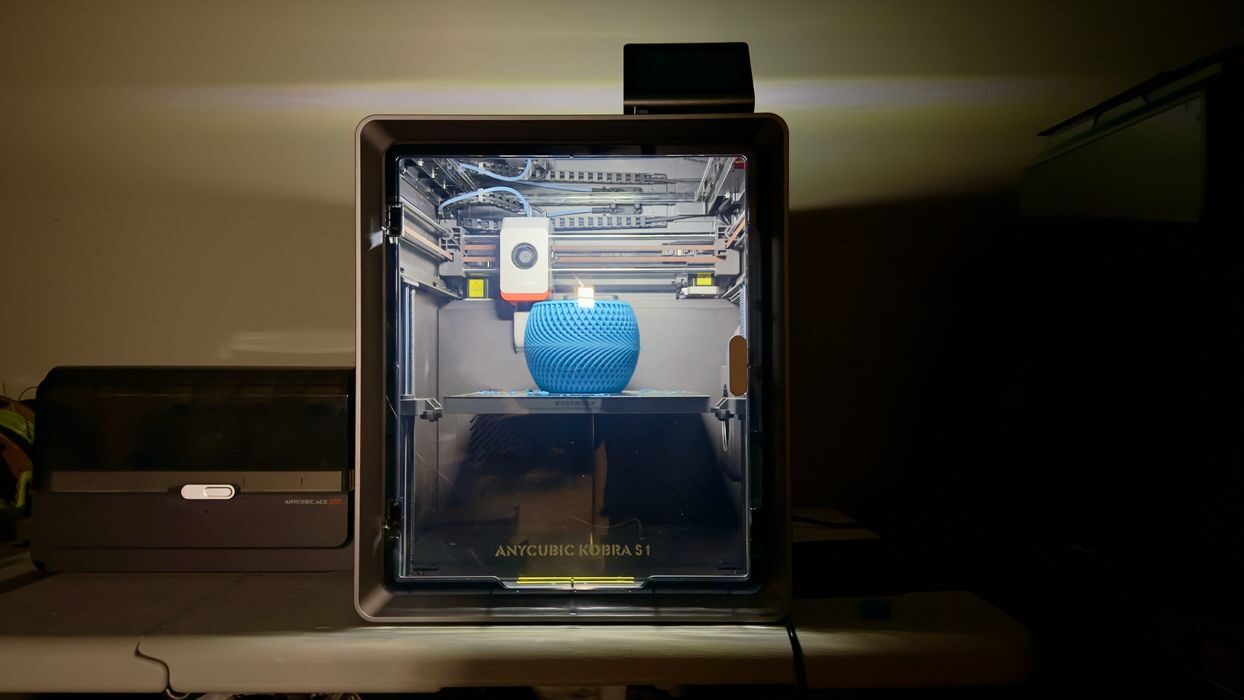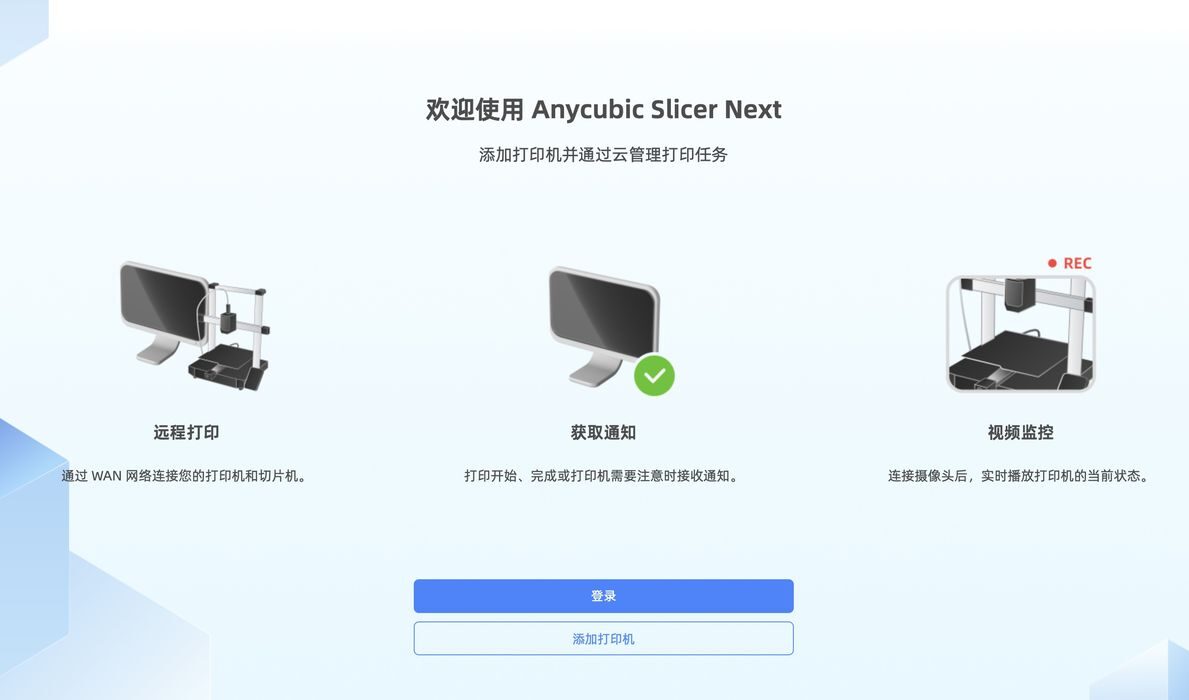
Our review of the Anycubic Kobra S1 Combo 3D printer concludes with Software, Print Results and Final Thoughts.
This is part three of a three-part series; please read parts one and two.
Anycubic Kobra S1 Combo Software

If there’s one thing that needs work on the S1, it’s the software. The software used is the “AnycubicSlicerNext”, as opposed to “AnycubicSlicerBeta” or “AnycubicSlicer”. The “next” version is a modified OrcaSlicer, and it includes the necessary profiles for the S1.

When testing jobs, you often load in someone else’s .3MF file. These frequently have configuration data for other 3D printer models, so you will get only the geometry.

The major issue with AnycubicSlicerNext is language. It was all going well for me until I got this message from the software. What’s wrong? I have no idea; I had to use a translator to proceed. Most of the popups in the software are in Chinese in spite of the language selection.

Here we’ve sliced a two-colour 3D model for testing a dual extrusion print. The software handles it well, as it is really OrcaSlicer. Just be sure to have the correct filament definitions and assignments before slicing the job.

I wanted a nice multicolor print for testing and selected the CuteDino 3D model. Here I’ve sliced this four-color job, but notice the print statistics:
- Total job time: 26 hours
- Actual print time: 3:11
- Flush time: 22:45
- Filament changes: 576
The “tower” takes 22.71g, and the Dino itself 28.84g. However, there is a substantial amount of pooping that takes up even more material, as you will see.

There is an Anycubic smartphone app that can be used to monitor and control the S1. The app mostly works, but I found that I could never get the video to work. The video does work from the desktop AnycubicSlicerNext software, however.

Yes, the popups on the smartphone app are also in Chinese.

Here is the real-time display of the S1’s status.

An interesting convenience feature is that the software can automatically match material types for you when dispatching a job. I had only one spool of ABS mounted in the ACE PRO, and the software automatically selected it for me.

Here you can see that the slicer reports a setup time of around four minutes. That is true, but wow, the S1 sure takes its time. It is actually quite frustrating to see it go through laborious maneuvers when it really doesn’t have to. “Why does the toolhead always go all the way to that corner instead of going to where it needs to go?” is a question I often asked myself.

This is the workbench tab in the slicer. It’s entirely in Chinese, even though I have English specified in the settings. Fortunately, I’ve seen this before, so I can make my way around, but for those new to 3D printing, it could be a bad thing. This is especially true for error messages where the operator is required to do something specific.
The Anycubic software for the S1 does work, but it needs quite a number of tweaks to make it more understandable and efficient.
Anycubic Kobra S1 Combo Print Results

I printed a number of items on the S1, both multicolor and not, in a variety of common 3D printing materials.

This is the Qubenchy, a new benchmark object I’m beginning to like a lot. It contains many features for testing. The S1 printed it quite well.

My CuteDino print eventually completed in 25.5 hours, far more hours than estimated. Keep that in mind if you have a large multicolor print to complete.

The Dino print itself was absolutely perfect. It was one of the smoothest and highest quality PLA prints I have ever done. I was astounded at the print quality, in fact.
I was also astounded by the mountain of waste produced for this relatively small job. It’s pretty clear that Anycubic needs to optimize their waste production. For example, they might consider retracting the filament before cutting it, which would significantly reduce waste.

I tried printing in ABS because the S1 is fully enclosed and should be able to handle that notoriously warpy material.
In fact, the print was also astoundingly good, just as good as the PLA print! This was easily the best ABS print I’ve ever done. There was no stringing, no warping, and a near-perfectly smooth surface. Outstanding!

PETG was another story. I had numerous failures where the material simply would not stick to the plate. Eventually, I managed to get the prints to stick by raising the bed temperature from 70°C to 85°C and slowing down the speed of the first layer.
It was at this point I realized there was no “tuning” menu on the S1. Normally, I would slightly tighten up the Z-gap between the nozzle and the plate, but it seems there is no way to do that on the S1.

After all the PETG attempts, I ran out of PETG, and then switched to PCTG, a wonderful material that should be more widely used.
Unfortunately, there is no print profile for it, nor can the ACE PRO be configured for using PCTG. I just used the PETG profiles instead (with my speed and temperature tweaks), as it is a very similar material.
The PCTG print came out quite well, although there were weird strings and blobs, as you can see in the image above. I think Anycubic should consider making a PCTG profile, which could clean up those issues.

I tried printing TPU. This material cannot be used in the ACE PRO due to its wet, spaghetti-like properties, so it has to be mounted on the rear of the S1 and fed directly into the PTFE tube.
I used the stock Anycubic TPU profile and was very surprised to see near-perfect results. Here I’ve printed a #3DBenchy, and it was completely flawless, with no stringing. Very impressive quality!
And what about the gift Bluetooth project? I used the QR code on the package to get the instructions, but instead, I was taken just to the main page of Anycubic’s MakerOnline 3D model site.
But where is the project for the speaker? I did a search and found several, but which one is the right one? They seem to be made by MakerOnline contributors, but I was not able to find the official project. Or is there an official project? No one seems to know.
While this really doesn’t affect the machine, it shows that Anycubic has some work to do with the experience of S1 operators.
Anycubic Kobra S1 Combo Final Thoughts

The Anycubic Kobra S1 Combo is both wonderful and incredibly frustrating. It can produce absolutely outstanding prints, yet the software is confusing, inconsistent, and often in a different language.
I pondered whether to recommend this machine due to the clearly not-quite-ready state of the software. In the end, my thought is that this is in fact a good machine, and that sooner or later, Anycubic should be able to fix the software. They can do so with online updates, changes to apps or websites without having to change the S1’s hardware.
The only hardware changes I’d like to see on the S1 would be an easier way to plug in that hot end cable and some fix for the ACE PRO tangles. However, that might be another software upgrade.
If you need incredibly high-quality prints and are able to make your way through some quirky software, the S1 might be your machine.
ANYCUBIC
KOBRA S1 COMBO
★ BEGINNER 7/10
★ ENTHUSIAST 7/10
★ PRODUCTION 7/10
BEST FEATURES
✔︎ Outstanding quality
✔︎ Multimaterial
✔︎ Attractive design
QUESTIONS
✖︎ Software quality
✖︎ Maintenance effort
✖︎ Language confusion
Via Anycubic
